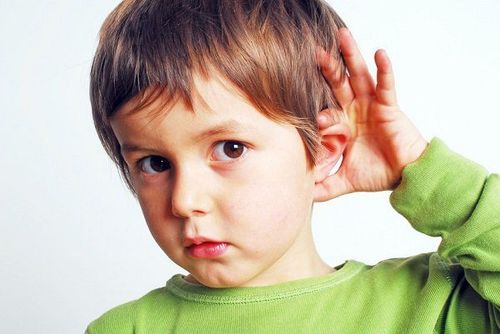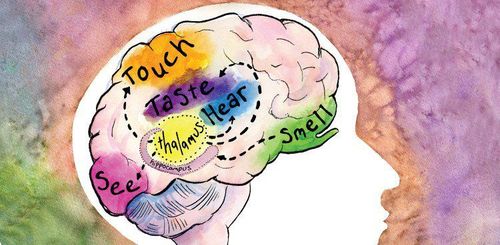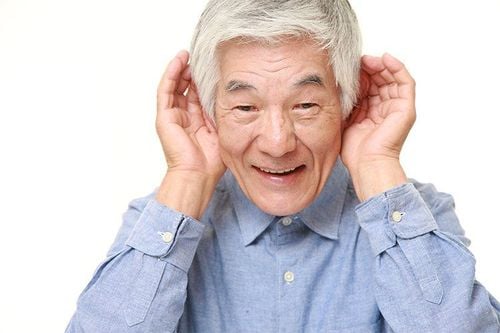This is an automatically translated article.
Damage to any part of the ear can lead to hearing loss. Loud sounds often damage the inner ear (cochlea). Injury, whether from a single exposure to extremely loud sounds or a long period of exposure to loud sounds, causes hearing loss. Noise destroys cells and membranes in the cochlea.
The world we live in is a world full of sounds. The audio headphones bounce music into both ears with a sound level comparable to that of a diesel locomotive. Household power tools can generate noise levels that only workers in high-risk occupations can hear. Not surprisingly, noise-induced hearing loss is the second most common form of acquired deafness (after aging). And many experts believe that much of the hearing loss that comes with increased age is related to the cumulative effects of noise.
The harmful effects of noise come from it destroying the cells located in the cochlea, the spiral-shaped organ located deep in the ear. These cells are like tiny hair-shaped projectors that are stimulated by sound. These stimuli are "translated" after being transmitted through the nerves to the brain. The delicate cells of the cochlea can repair themselves if damaged, but then, permanent damage can occur. If your ears are over-stimulated, such as during a rock concert, you may experience a stuffed-in-ear sensation for 1-2 days. The cells in the ear can regenerate, but if repeated too many times, or too severely, the cells cannot regenerate and die. Each person has a certain number of cells from birth, and only a few cells, do not grow new.
Damaged hair cells cannot generate electrical signals, affecting hearing. Whether it's loud sounds for a short period of time – like a gunshot, or repeated or continuous loud sounds – like at construction sites, can damage hair cells.
1. Symptoms of noise-induced hearing loss
Noise-induced hearing loss often manifests as difficulty hearing higher frequency sounds, which is easy to detect with an audiogram test. The result will show a drop to the right.
Day by day, a person may have difficulty hearing speech, especially words with "s," "f," "sh" and "th" sounds in them. They can hear but have trouble understanding what others are saying, even if they are raising their voices.
Other signs that a person needs a hearing test include:
Ear pain after exposure to loud noises People around notice a person talking very loudly or shouting Tinnitus — sounds like ringing, humming, roaring, or buzzing in the ears. Experiencing duplex, or "two-tone hearing," although this is rare. In general, we shouldn't be exposed to any sound above 85 decibels, although the risk depends on the duration and frequency of exposure to the noise, as well as how close they are to the sound. A hair stylist who uses a hair dryer at 70 dB all day can still experience hearing loss, due to how long they are exposed, and how often they are exposed.
2. Common causes of noise-induced hearing loss
2.1. Noise at work
According to the National Institute for Occupational Safety and Health of the US Centers for Disease Control and Prevention, 1 in 4 US workers is repeatedly exposed to hazardous noise and about 12% of the total workers are hard of hearing. 8% of them have tinnitus (possibly due to noise exposure). CDC data shows the highest-risk jobs include:
Mining and oil and gas extraction Agriculture Construction and carpentry Military service Employers must have protective measures hearing to limit employee exposure to hazardous noise, including providing hearing protection, maintaining machinery, placing barriers or isolating noise sources, and periodic employee health checks . Workers who are provided with hearing protection in the workplace should strictly follow the regulations. Noise-induced hearing loss can be prevented.
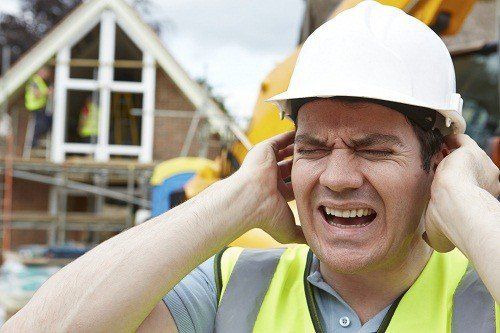
Người lao động làm việc xây dựng hay nghề mộc có thể bị ù tai do tiếng ồn
2.2. Does your hobby affect your hearing?
Things we do for fun can also cause noise-induced hearing loss, including hunting or shooting at a shooting range, attending concerts, listening to loud music, operating dumpster grass and houses, ride large motorcycles and snowmobiles.
3. Other harmful effects of exposure to loud noise
In addition to damaging hearing, research shows that noise pollution and noise-induced hearing loss can lead to:
Stress Anxiety Insomnia, even after the noise stops High blood pressure Increased heart rate heart Lonely due to hearing loss Depression due to hearing loss
4. How to prevent noise-induced hearing loss
Noise-induced hearing loss is often permanent, so it's important to take precautions to protect your ears.
Disposable foam earmuffs The earmuffs completely fit the ear and form a partial block, reducing noise levels by 15 to 30 dB. Replacing noisy machine parts and using lubricants can reduce friction and reduce noise. Many automobiles, farm equipment, and other machinery have silencers, silencers, and bearings that can dampen sound. Lower the volume. Headphones inserted directly into the ear canal create loud music right at the eardrum. Pay attention to the volume of music and never use music to block other unwanted sounds. Always pay attention. Once you become aware of noise hazards, you will notice them everywhere and be able to prevent them. For example, avoid walking directly through active construction sites, wear foam earplugs when mowing the lawn, or operating machinery. SEE ALSO: When is an audiometric needed?
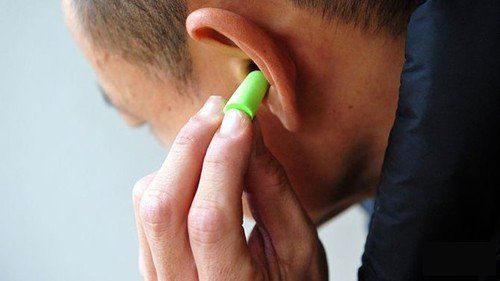
Sử dụng nút bịt tai để giảm tiếng ồn
5. Methods of treatment
Unfortunately, noise-induced hearing loss is permanent. Often, the best treatment for noise-induced hearing loss is the correct fitting of hearing aids. Today's technology works better than the hearing aids of decades ago, and solutions are widely available for every budget and living need.
If you already have hearing loss, see a specialist to find the right treatment.
With many years of experience in examining and treating ENT diseases, now Vinmec International General Hospital has become one of the major health care centers, capable of examining and screening filtering and treating many diseases in depth. Therefore, if you find that there are abnormalities in hearing ability, hearing loss, etc., you can go to Vinmec International General Hospital to examine and receive support and advice from doctors. doctors and experts.
Please dial HOTLINE for more information or register for an appointment HERE. Download MyVinmec app to make appointments faster and to manage your bookings easily.
References: webmd.com, cdc.gov, healthyhearing.com




